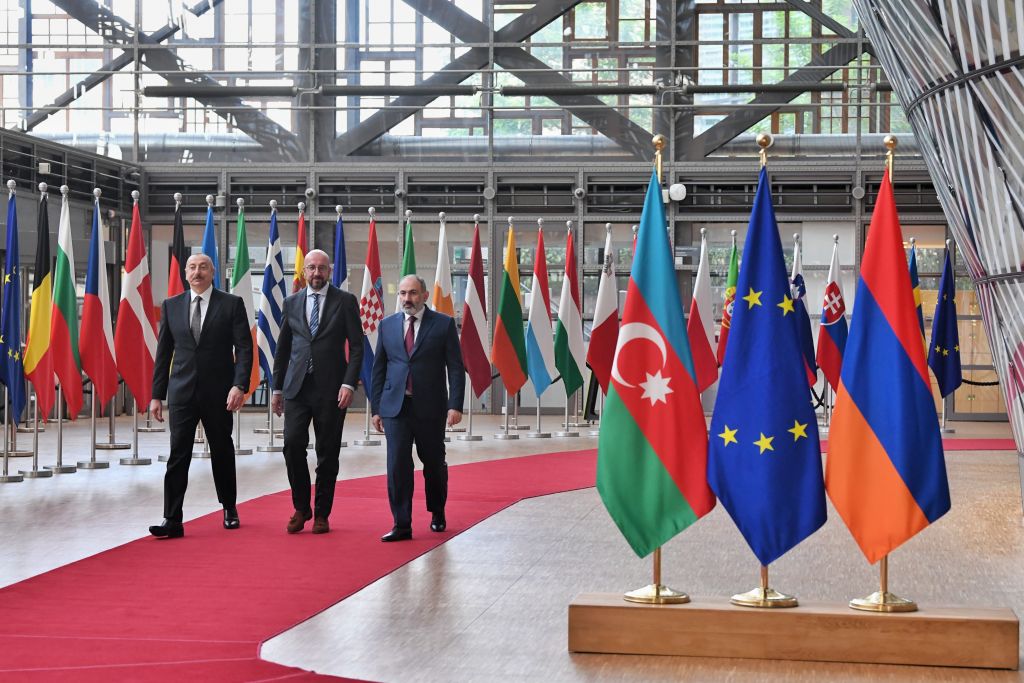Azerbaijan is currently working on a peace deal with Armenia, Azerbaijan’s President Ilham Aliyev said Saturday during a plenary session on “Moving Mountains? Building Security in the South Caucasus,” at the Munich Security Conference.
“I think that Azerbaijan and Armenia need to demonstrate that the transition from the long-lasting stand of mutual hatred can end, and hostility must cease. We are now working on a peace agreement between Armenia and Azerbaijan. Hopefully, we would conclude it eventually,” Aliyev said.
Armenia has sent Azerbaijan a draft proposal for a peace settlement, Armenian Prime Minister Nikol Pashinian said this week. Baku is studying Yerevan’s draft peace proposals, Aliyev said.
Besides the panel, Aliyev and Pashinian also came together in talks hosted by U.S. Secretary of State Antony Blinken on the sidelines of the Munich Security Conference on the same day which was the two leaders’ first face-to-face encounter since late October, when Russian President Vladimir Putin hosted talks in the Black Sea city of Sochi. On Dec. 7, the meeting in Brussels was scrapped.
“As far as we understand in our communications with our American partners and partners from European Union and also from today’s trilateral meeting with Prime Minister Pashinian, which was organized by Secretary Blinken, we have a common understanding that there should be a two-track approach to the situation in the region,” Aliyev maintained.
“First, Azerbaijan-Armenia peace talks track. Second, Azerbaijan’s communications with the Armenian population in Karabakh,” he underlined.
“So, this two-track-solution actually separates our talks with Armenia from our internal issues like our communications with Armenians in Karabakh. And also it was agreed with our international partners that there will be discussions on the rights and securities of the Armenian minority in Karabakh. And we are ready to do it,” Aliyev added, indicating that these discussions would be with those representatives of the Armenian community who were born, and lived in Karabakh throughout their life. “But not with the person who was exported from Russia to have the leading position in Karabakh,” he noted.
On the other side, tensions have escalated between the two South Caucasus nations over a blockade of the Lachin corridor, the only land route giving Armenia direct access to the Karabakh region.
Azerbaijani civilians and environmental activists have been facing off since Dec. 12 with Russian peacekeepers on the Lachin corridor.
Saying that there has been no blockade, Aliyev added, “Since Dec.12, 2022, until today when our activists from civil society came to the checkpoint, there have been over 2,500 vehicles, including tracks of Russian peacekeepers and representatives of Red Cross. Almost 100 medical patients from Karabakh were taken by Red Cross to Armenia for treatment.”
The Azerbaijani President said that if Armenians in Karabakh try to use the Lachin road, no one will stop them.
“Karabakh Armenians, are Azerbaijani citizens, and are a minority. Azerbaijan is a multi-ethnic country, and all minorities in Azerbaijan enjoy the same rights and privileges including cultural, linguistic, and any other and also security,” he underscored.
Relations between the former Soviet republics of Armenia and Azerbaijan have been tense since 1991 when the Armenian military illegally occupied Karabakh, a territory internationally recognized as part of Azerbaijan, and seven adjacent regions.
Clashes erupted on Sept. 27, 2020, with the Armenian Army attacking civilians and Azerbaijani forces, violating several humanitarian cease-fire agreements. During the 44-day conflict, Azerbaijan liberated several cities and around 300 settlements and villages that Armenia had occupied for almost 30 years.
The fighting ended with a Russian-brokered agreement on Nov. 10, 2020, which was seen as a victory for Azerbaijan and a defeat for Armenia.
However, the cease-fire has been violated several times since then.
Source : Daily Sabah


